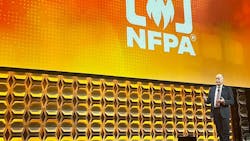NFPA: Need for Fire Safety Never Greater
By TOM LYONS, National Fire Protection Association
“The world needs you more than ever.”
That was the unequivocal opening line of Jim Pauley’s annual message to thousands of attendees at the General Session, kicking off the 2024 NFPA Conference & Expo® in Orlando Monday, June 17. It was the ninth time Pauley has delivered his keynote address since becoming president and CEO of NFPA in 2014.
Pauley combined his usual optimism with a candid discussion about the steps NFPA® is taking to grow and diversify its offerings to better serve its stakeholders. His speech was a heavy mix of concern and straight talk about current safety environment and the existential threats facing all standards development organizations—a convergence of unprecedented challenges for NFPA and other standards developers.
“From batteries to wildfires to the housing crisis to increased use of green energy technologies to increasing natural disasters from changing weather conditions. Never has the need for safety to accompany societal progress been so paramount,” said Pauley.
Our system of safety is at risk
Pauley’s message was clear: The system that protects people and property from fire is at risk.
He and others at NFPA have long warned about the challenges to the codes and standards system. The strength of NFPA lies in its open, transparent, and consensus-driven standards development process, which has evolved over a century to meet changing technical and safety needs.
"We see examples every day where folks are trying to displace, water down, or do away with true consensus standards."
Pauley highlighted the role of safety professionals, who he called the engines that drive progress in the NFPA Fire & Life Safety Ecosystem™, by integrating the latest research and technology into codes and regulations. However, he expressed deep concerns about pressure from special interests, complacency, and ignorance. He warned that vital voices, such as fire marshals, are increasingly marginalized by those lacking insight into modern safety dynamics.
“I am concerned that the highly successful codes and standards process, one recognized by accreditors such as ANSI, the American National Standards Institute ... is being bypassed in some cases and rapidly supplanted with codes and standards that do not have the time-tested principles of an open-consensus process. We see examples every day where folks are trying to displace, water down, or do away with true consensus standards," he said.
Pauley cited alarming examples where proven safety measures are neglected, such as communities rebuilt with vulnerable materials after wildfires and new homes constructed without essential fire sprinklers due to the influence by powerful interest groups.
Defending the standards process
A key focus of Pauley’s address was the importance of defending and advocating for a true consensus standards process. Pauley emphasized the critical need to combat copyright challenges and legal actions that threaten the integrity of the standards development system.
He said that NFPA has led the charge to raise awareness of these issues, often falling on deaf ears in years past, to fight back a vocal minority who pushed a false notion that private sector codes and standards—once incorporated by reference—lose their copyright.
“If standards developers lose the ability to control the distribution of their intellectual property, it will crush and likely end the private sector standards development system in the United States,” Pauley said.
NFPA has proactively raised awareness and advocated for legislation to ensure that all standards development organizations retain their copyright and that the private sector standards system remains strong.
The federal Pro-Codes Act, which NFPA has supported, aims to secure the future of this process. The legislation recently passed by the U.S. House Judiciary Committee in a bipartisan vote is crucial for maintaining the system that has made NFPA codes and standards so effective. Pauley warned that without such protections, the collaborative, expert-driven approach to standards development could be undermined, risking the safety of communities worldwide.
Stagnancy is not an option
Pauley committed to continued growth and leadership at NFPA, stating, “We don’t sit by and watch things happen. We grow to serve you better and drive our mission of safety forward. Stagnancy is not an option.”
He outlined four strategic areas where NFPA is evolving to serve the safety community better.
- Being More Digital: NFPA is leveraging digital tools to enhance accessibility and training. The NFPA LiNK® platform, the new NFPA website, and the NFPA Learning Portal make it easier for professionals to access codes, standards, and additional resources. Innovations like virtual reality simulations for firefighters are also being developed to provide dynamic training solutions.
- Being More Global: To meet the growing demand for NFPA training, Pauley said the organization is expanding its global footprint, particularly in Latin America and the Middle East. He also announced the launch of a new NFPA Authorized Education Network, which will offer official training delivered by recognized instructors, further extending the organization’s reach and impact.
- Being More Connected: NFPA is revitalizing its membership sections to connect professionals better and by doubling the size of its U.S. field operations to support local efforts to advance safety. The growth in NFPA-certified professionals underscore the global recognition of these certifications, enhancing connectivity and resource sharing among safety experts.
- Being More Diversified: Pauley said the launch of NFPA Global Solutions™ marks a significant step in diversifying the organization’s offerings and business strategy. This new company will provide compliance solutions, digital products, and advisory services. The acquisition of Dyne Fire Protection Laboratories is just the beginning of this diversification effort, which aims to meet the evolving needs of stakeholders.
In closing his General Session address, Pauley assured attendees that the resolve of NFPA is unwavering. Whatever the challenges, the organization is committed to matching the modern world’s growth and complexity with its focused growth to ensure safety remains paramount, just as it has for nearly 128 years.
##########
